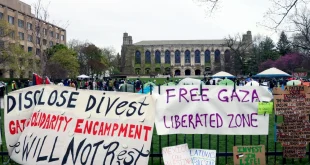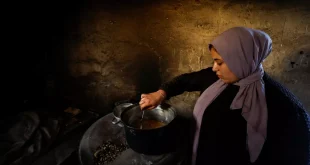Alon Liel, a former Israeli foreign ministry director general, in Jerusalem, 12 April 2007 [MENAHEM KAHANA/AFP via Getty Images]
Former Israeli Ambassador and Director-General of the Ministry of Foreign Affairs Alon Liel has urged Australia to recognise the state of Palestine. Writing in The Guardian, Liel, who was Israel’s most senior diplomat, praised the Labor government in Canberra for adopting a hard-line policy towards the occupation state while urging Australia to recognise the State of Palestine.
Australia’s federal government announced this week that it would officially bring its policy in line with international law and refer to Israel’s settlements in the West Bank as “illegal” and the territories as “occupied”.
Responding to the move, Liel urged the Oceanic state to take the next step and recognise the State of Palestine: “We need support to push back against the efforts of the Israeli government and strive towards two democratic states living peacefully side by side. The international community must push back by giving Palestine increasing international legitimacy. Doing so sends a message that they will not stand idly by while Israel’s far-right realises its agenda. More states must recognise Palestinian statehood to push back against this impending reality.”
Liel’s appeal to Australia and the international community is born out of desperation to rescue Israel. He says that after dedicating his professional life to representing and promoting Israel’s interests worldwide, the country is now in a perilous situation. The ex-diplomat acknowledged that even though the illegal settlement enterprise has been backed by “successive governments”, thus preventing the establishment of a Palestinian state, the thought of Israelis being subjected to an anti-democratic authoritarian government has raised his concern.
After explaining that the Benjamin Netanyahu-led ultra-nationalist government is racing towards annexation of the Occupied Palestinian Territories (OPT) and permanently entrenching the “daily humanitarian and anti-democratic nightmare that the Israeli occupation has become,” Liel added: “During the last six months these methods have spilled into Israel itself, to a point of endangering our own precious democracy – the basis of our proximity to the Western world.”
Liel also conceded that the far-right ultra-nationalist strain inherent in Zionism has become the dominant ideology of the state he has served for decades. “The Israeli right has always dreamed of a sole Israeli sovereign between the Mediterranean Sea and the Jordan River,” Liel explained, arguing that the current government is determined to install a regime that grants “exclusive and unquestionable right [of the Jewish people] to all areas of the land of Israel” and commit to “promote and develop settlements in all [its] parts.”
The wall-to-wall consensus in the human rights community over Israel’s practice of apartheid is down to the recognition of the fact that a single regime controls all the territory between the Jordan River and the Mediterranean Sea with virtually no prospect of a Palestinian state and the chance of six million non-Jews enjoying the same basic rights as Jews. Israeli leaders now acknowledged this fact.
Liel pressed that Australia’s recognition of the State of Palestine would send a strong message that the international community will not remain idle while extremist agendas erode the prospect of a two-state solution. This move aligns with Australia’s values of diplomacy, fairness and justice, echoing the sentiment that just as Palestine should not have veto power over Israel’s statehood, Israel should not hold veto power over Palestinian statehood.
 Sri lanka Muslims Web Portal Diversity and Inclusiveness
Sri lanka Muslims Web Portal Diversity and Inclusiveness



